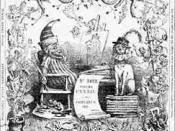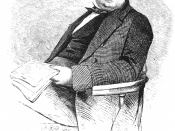Changes in the 19th Century British Press
During the nineteenth century the press changed because of changing attitudes in society, advances in technology and changes in law. The press changed gradually over this course with certain people playing an important role in this progression.
The first thing to consider is the feelings towards the press from the turn of the eighteenth century into the nineteenth century. It was a time of popular agitation where the government sought to suppress free political expression through various strategies. Some of these included fining editors and giving them prison sentences, sensitive material had to pass official censors before being published, the Stamp Tax was increased in 1815 and again in 1819 as attempts to try and limit the number of radical papers in circulation and the government also paid proprietors money in order to buy the papers' support and to prevent them from publishing offensive reports.
The early nineteenth century therefore saw a division in the press; there were two styles of newspapers, the quality press and the popular press. The quality press were subject to both stamp and paper duties and attracted readers at the higher end of the market. The popular press was aimed at the working class to promote political agenda concerned with this fraction of society. Several weeklies were launched in the nineteenth century, some legitimate others not. The legitimate papers included stamp duty in the cover price; some of these papers were the Sunday Times, the Observer and the News of the World. People who refused to pay the tax on principle produced the unstamped illegal papers such as the Poor Man's Guardian.
The unstamped papers were very popular since they were much cheaper than legitimate papers. These papers were prepared to use strong language and personal attacks on...


